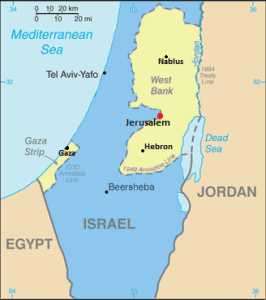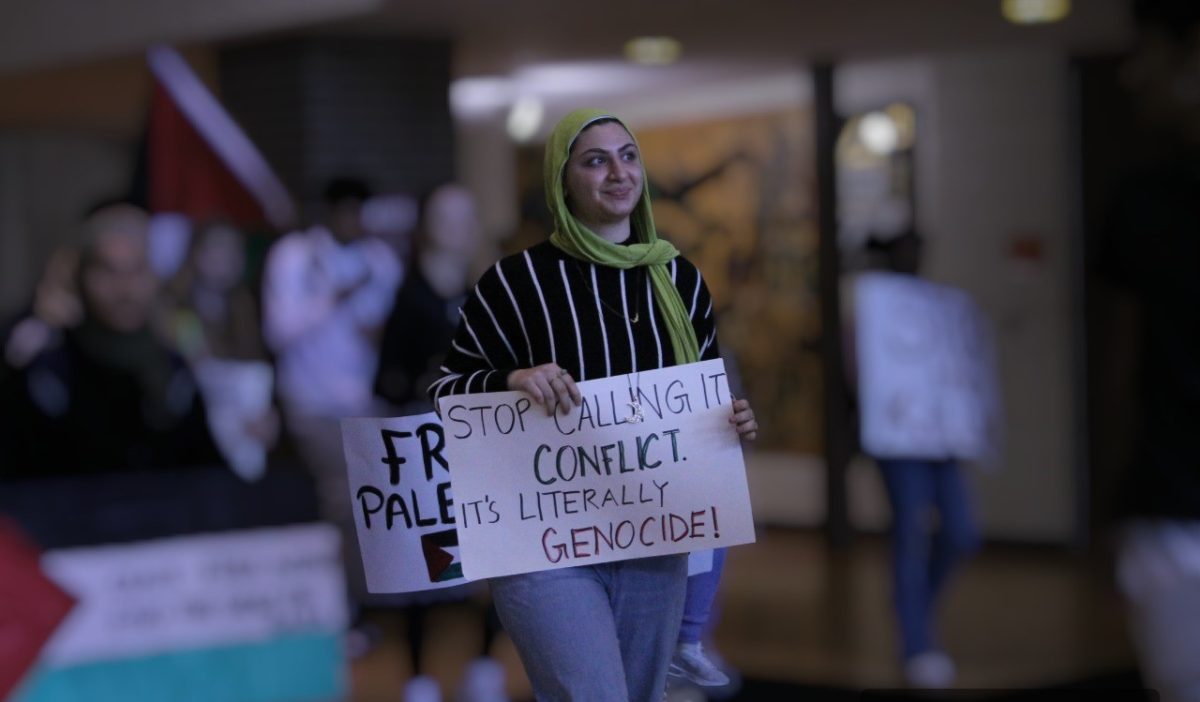“We are living through history and we can change it now instead of regretting it later,” sophomore Omar Elghawy proclaimed to his peers. “History repeats itself again.”
Elghawy shared this impassioned message on Thursday, November 9th, 2023, when students at Portage Northern High School walked out of their 3rd-hour classes in protest of the Israel-Palestine war.
A complicated backstory
The Israel-Palestine war is in the news headlines today, but the conflict itself stretches back to the late 1800s when Jewish people fled the pogroms of Eastern Europe in hopes of establishing a Jewish state in the Land of Palestine, which was under Ottoman rule at the time. The city of Jerusalem, located in the middle of Palestine, became a popular relocation destination because it was a holy city for all three Abrahamic faiths (Christianity, Islam, and Judaism). Jewish and Palestinian communities clashed during the Jewish migration because Palestine wasn’t empty: Palestinians had already made this land their home, and the influx of Jewish people meant the displacement of Palestinians.

Jerusalem and surrounding Palestine then came under British rule in 1917, and during that time, Britain took further steps to create a Jewish national home there. The conflicts continued through World War II, when the Holocaust displaced a large number of Jewish people who either had no home to return to or who felt unsafe returning to their home countries. In 1948, Great Britain, the colonial power of Palestine, formally promised Israel to the Jewish community to make their home, and modern-day Israel was born.
Seventy-five years later, issues still arise.
Included within the territorial boundaries of Israel is Palestine, which is split up into two sections: the West Bank and the Gaza Strip. Conditions for the mostly-Muslim populations there are dire, and there are electrical fences forcing the people there to be cut off from the outside world. “[The government of] Israel controls all the food that goes in and water that goes in and they have just completely cut that off,” explained sophomore Maya Abduhlak, who is Syrian and, on top of being invested in staying up to date with geopolitical events in the Middle East, has family and community ties to the region. Abdulkah also shared that the Israeli government is dropping sulfur bombs and white phosphorus on residents of the Gaza Strip, which was recently confirmed by the human rights group Amnesty International. Both of those are poisonous chemicals and gasses, and bombing with these is banned by international law.
The goal of peace and justice for Gaza and Palestine is often hindered by the fact that the region is controlled by Hamas, a militant group that attacked Israel earlier this year and incited the latest waves of violence in the area. For world governments and ordinary people alike, it has been difficult to separate the radical political group from the Palestinian civilians that it rules.
Walking out for change
While the United States has consistently held a pro-Israel political stance, some Portage Northern students hope to bring light to the terrible conditions that Palestinian citizens are facing while additionally calling for a ceasefire in Gaza. They joined the largest pro-Palestine movement in history, driven mostly by young people. Upwards of 30 students walked out of school during a 30-minute window on November 9, which O. Elghawy explained was, “global shut down day for Palestine . . .This means walking out of school or work, not going out to eat or buying things, taking the day off, and stopping all extra activities.”
Students at both Portage Northern and Portage Central organized their own walkouts. “It is just the least we can do to show our support instead of turning a blind eye like the rest of the world,” said senior Youseff Elghawy, Omar’s brother. During the walkout, students made signs, chanted, and expressed their hopes for the future. While walking down Oregon Avenue to East Milham Avenue, the student group chanted things like “Free, Free Palestine” “What do we want? Ceasefire. When do we want it? Now,” and “From the river to the sea, Palestine will be free.” Student signs embraced the same feelings: M. Abdulhak’s read, “It is not a conflict, it is literally a genocide.”
For many of the marchers, the conflict is very personal. “I know my Arabic teacher, she’s Palestinian, and she has family in Palestine,” shared junior Jenna Abdulhak. “Another family friend of mine, eight of her close relatives, her sisters, her nieces, died. There’s still more dying and we barely know because there’s no communication.” Other students joined their classmates as allies. “I think what’s happening right now in Palestine is unjust and unfair,” said senior Simon Thompson. “I felt like I should be using my voice.”
An uncertain future
As of this publishing, ABC News reports that in Israel, at least 1,200 people have been killed and 6,900 others have been injured since Oct. 7. An additional 11,240 people have been killed and 29,000 others have been injured during that same time frame in the neighboring Gaza Strip. A vast majority of these people are Palestinian Arabs: the Population Reference Bureau, a nonpartisan, not-for-profit research organization, stipulates that 99% of Gazans and 92% of West Bankers are Sunni Muslims, with the rest of the population consisting of Christians.
“These people look like me, talk like me, they eat the same foods as me, and speak the same language. They look just like me and they’re dying in insane numbers,” said M. Abdulhak, who, while disturbed, also finds reasons to be hopeful. “Portage Northern students…I am really proud of us honestly,” she said. “I think it was a really courageous thing for everybody who came out today to show their support for our fellow humans.”
For information about how to help humanitarian efforts in Israel and Gaza, visit:






Mya Martinez • Oct 21, 2024 at 11:40 am
This is very enlightful and good article. As I’m reading I love how the students took charge and stood up for what they believe is right. Also the kids knowing what they are talking about.
Abdul al Yousef • Nov 16, 2023 at 11:42 am
Nice article